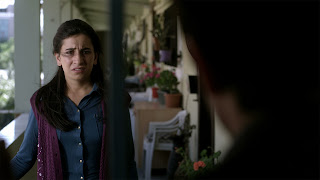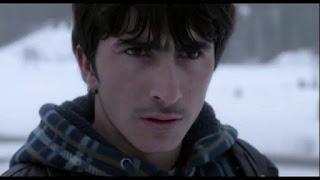Hisham Zaman on Before Snowfall
5/29/13
It has been a month since I saw Hisham Zaman's Before Snowfall at the TriBeCa Film Festival, but I can't stop thinking about it. I still think about Siyar (Taher Abdullah Taher), a teenager in a village in
 Hisham Zaman Photo: DP
Hisham Zaman Photo: DPDanny Peary: For the audience to experience the pain and the suffering in your film, I think you created characters you loved. After investing six years in the making of this film and taking an epic journey along with Siyar and Evin, did you feel that you had to experience their emotions as well?
Hisham Zaman: I felt every moment with them, including every moment of grief. I felt pain and delight and all the mixed feelings they had on their journey. I felt a responsibility to not only make a good film but make my characters human. Because I met them--I went to their homes and met with their families. I felt a responsibility as a director to really feel the suffering, all the emotions that come with this subject. I felt that I had to ask for that extra shot to be sure that we had it, so that the portrait of this boy would be realistically served. I felt myself also in a kind of warzone, we had to survive in severe conditions, because we were shooting in geographically hard, harsh places. For instance, the film begins and ends in
DP: When you finally finished the film in the editing room after so many years, was it a happy or devastating moment for you?
HZ: I had a feeling of emptiness, and wondered how the film would be perceived and if it would be understood. I had the feeling that I would make it better if I had one day more. That’s how I feel every day while making a film. I go to the set in the morning and I ask myself, “Will I make this scene good by the end of the day?”?
DP: You now have to do a quick movie to get it out of your system. Six years is long time!
HZ: Yeah, yeah. But it’s important to make clear that during those six years I was concurrently shooting another feature film. But I can say that I had this film in my head for six years because I wanted it to be the one huge film that I’d be known for in the world. That’s why I paid so much attention to the details an audience doesn’t think about. I did much of the music that plays in the background. And Siyar’s breathing inside the oil tank? That’s me. I felt these things were necessary for me to do, because I needed to make a film that I can stand for, not just today but also in ten years.
 Siyar is wrapped up so he can be smuggled out of Iraq in an oil tanker
Siyar is wrapped up so he can be smuggled out of Iraq in an oil tankerDP: You went to different places, it was an epic journey, but did you try to film it chronologically?
HZ: We did. But we had a weather problem in
DP: Did you work with the two of them for two years straight?
HZ: No, I worked with them on the days we shot the film. We didn’t rehearse much. Actually, the rehearsal is the film. Often what you see is what I saw for the first time. So we had a harsher production. If I’d prepared them so that every line was delivered perfectly I wouldn’t have caught the reality of the way they said things. In the morning we took care of the technical stuff such as the camera set up, and at the same time I’d work with the actors. I never give them a script. I gave them the idea of who they are and who they’re going to be on this journey, but I never told them which scene was coming after. And I never told Taher what was going to happen to Siyar at the end of the journey. So everything was a surprise for the actors; sometimes they liked the surprise, sometimes they were confused by it. But all in all, the result was effected by this way of working.
DP: When the fleeing Siyar runs down the hill and smack into tree, was that scripted?
HZ: No, but Tahar saw a tree at the bottom and ran into it on purpose. He is physically strong, he participates in a kind of wrestling.
DP: In the next scene there is bruise by Siyar’s eye. Was that real?
HZ: No, that was makeup. I get this reaction from people, that they feel the pain.
 Siyar's sister refuses to adhere to his command to marry someone she doesn't love
Siyar's sister refuses to adhere to his command to marry someone she doesn't love Marius Matzow Gulbrandsen won the Best Cinematography prize at TFF
Marius Matzow Gulbrandsen won the Best Cinematography prize at TFF Siyar contemplates a honor killing of his sister
Siyar contemplates a honor killing of his sisterDP: How old were you when you went to film school?
HZ: I was 26.
DP: I ask you’d that because your age while making conceiving this film comes to mind when I think of what I think is a key moment in the film. It’s at the beginning when the men of the village tell Siyar he’s a man. Of course, he’s a boy but believes them. Did your youth affect this whole film? If you were older, if you were 50, would you have made it?
HZ: It’s a good question, because I was thinking then that I should be making easy films and do the difficult personal film when I am fifty.
DP: No, I think Before Snowfall is a young person’s film.
HZ: It was an idea I’d had since film school, but I never was able to put it together in this way when I was that young. I needed the experience of making short films, and to see the struggle with my own eyes, and collect pictures, videos and all this material to study so I could portray it well.
DP: As I said, Siyar is a boy. The way I see it is that all the men in his world let him down. All that honor stuff is forced on him by older men.
HZ: Yeah, but it’s also normal in the
DP: I'd say we don’t need to wait until the end to see that. We see that all the way through the movie. His sister tells him early in the movie, "You don’t understand being in love." He does come to understand love through his relationship with Evin. He changes.
HZ: I think it’s easy for journalists to focus on the honor killing, but the film is much more than that. It's about the landscape of culture, tradition, life, and city, how he reacts to that and learns to be the man he is. He goes out of his village like a boy, but he becomes a man in the end. But what kind of man? That’s for the audience to decide.
DP: All through the film we recognize his potential and then...
HZ: Let’s not reveal the ending. But I can say that what happens is because of choices he made.
DP: Evin melts his heart and provides him with love and the companionship, helping him evolve from confused boy to good man. Does she change in a good way too?
HZ: I believe so. She's going from being a thief to searching for a better life and dreaming about a boyfriend. In the ghetto, she uses the people around her to survive. But in this boy she finds trust and she finds something that is unique. We see something in the eyes of those two young people that makes us feel that they will take care of each other. But like him, she has her own project, to reach her father in the West.
 Siyar and Evin
Siyar and EvinHZ: I know The Searchers. Nobody had brought it up before. It's an honor that you talk about this.
DP: Similar scenes from an American movie and a German-Iraqi-Norwegian coproduction have the same emotional impact. So talk about the universal themes in your movie.. What do you think people around the world should take from this?
 Taher Abdullah Taher as Siyar
Taher Abdullah Taher as SiyarDP: How is it being at the TriBeCa Film Festival.
HZ: It’s a big thing for me to be here. Suddenly the spotlight is on my film. I love
DP: I was amazed by the number of extras you have in your film. I felt I was on a trip.
HZ: That's what I hoped. We had really, really good help in many places. When the people saw they were part of something important, they wanted their names on the film. They felt this film takes on subject that they need to be talked about.
DP: Not only that, but you put your film in the water and you let it flow.
HZ: Exactly!
No comments:
Post a Comment